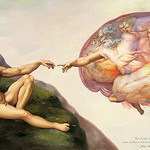Posted by Roberta Grimes • August 17, 2024 • 14 Comments
Jesus, The Source
Amazing grace, how sweet the sound
That saved a wretch like me!
I once was lost, but now am found.
Was blind, but now I see.
‘Twas grace that taught my heart to fear,
And grace my fears relieved;
How precious did that grace appear
The hour I first believed.
– John Newton (1725-1807), from “Amazing Grace” (1779)
 Christianity is among the most punitive religions that anyone ever has imagined. As we know, all religions are man-made. And Roman Christianity, in particular, was designed by and for the Roman Emperor Constantine, as a way for him to control by fear the vast numbers of people in his empire. Constantine’s minions even invented a fake devil with powers, and a fiery hell in which Christians would burn forever for even minor sins, with “sins” being defined as infractions of religious rules. In defiance of all the laws of physics, sinners even would remain intact while burning alive in hell forever. Over time, especially sadistic Christian theologians have come up with their own especially awful refinements. Take Calvinism, for example, where God supposedly decides even before we are born who will go to heaven and who will instead burn in hell. If you are a Calvinist, you cannot know for your entire life on earth whether you are elect or you are damned, but whichever one it is, your fate is sealed before birth. No matter how much good you might do in your life, if you are a condemned Calvinist, then you will burn alive and aware in hell, regardless.
Christianity is among the most punitive religions that anyone ever has imagined. As we know, all religions are man-made. And Roman Christianity, in particular, was designed by and for the Roman Emperor Constantine, as a way for him to control by fear the vast numbers of people in his empire. Constantine’s minions even invented a fake devil with powers, and a fiery hell in which Christians would burn forever for even minor sins, with “sins” being defined as infractions of religious rules. In defiance of all the laws of physics, sinners even would remain intact while burning alive in hell forever. Over time, especially sadistic Christian theologians have come up with their own especially awful refinements. Take Calvinism, for example, where God supposedly decides even before we are born who will go to heaven and who will instead burn in hell. If you are a Calvinist, you cannot know for your entire life on earth whether you are elect or you are damned, but whichever one it is, your fate is sealed before birth. No matter how much good you might do in your life, if you are a condemned Calvinist, then you will burn alive and aware in hell, regardless.
 Julian of Norwich (c.1342-1416+) was a Medieval anchoress, mystic, and seer. She has been the subject of Richard Rohr’s daily meditations during this past week, and what she received from God as the truth about sin reminds us to listen to Jesus again when Jesus talks about sin! Richard Rohr, for those who have not been following him, is a widely revered Franciscan priest who heads the Center for Action and Contemplation (the CAC) in Albuquerque, New Mexico. We should just add that an anchoress was a woman, most often a nun, who in the Middle Ages was closed into the very wall of a church, without a door but with a window into the sanctuary so she could participate in the Mass, and also with a window to the outside so she could speak to and pray with those who passed by. No one now knows Julian of Norwich’s birth-name. What she still is known for is her youthful series of visions when she was very ill – she called them “showings” – and her later in life divine revelations from God. Julian’s revelations offer a loving alternative to the strict focus on sin which characterized the Christian theology of her time. Mirabai Starr of the Center for Action and Contemplation writes:
Julian of Norwich (c.1342-1416+) was a Medieval anchoress, mystic, and seer. She has been the subject of Richard Rohr’s daily meditations during this past week, and what she received from God as the truth about sin reminds us to listen to Jesus again when Jesus talks about sin! Richard Rohr, for those who have not been following him, is a widely revered Franciscan priest who heads the Center for Action and Contemplation (the CAC) in Albuquerque, New Mexico. We should just add that an anchoress was a woman, most often a nun, who in the Middle Ages was closed into the very wall of a church, without a door but with a window into the sanctuary so she could participate in the Mass, and also with a window to the outside so she could speak to and pray with those who passed by. No one now knows Julian of Norwich’s birth-name. What she still is known for is her youthful series of visions when she was very ill – she called them “showings” – and her later in life divine revelations from God. Julian’s revelations offer a loving alternative to the strict focus on sin which characterized the Christian theology of her time. Mirabai Starr of the Center for Action and Contemplation writes:
“Julian of Norwich is known for her radically optimistic theology. Nowhere is this better illumined than in her reflections on sin. When Julian asked God to teach her about this troubling issue, he opened his Divine Being, and all she could see there was love. Every lesser truth dissolved in that boundless ocean…. Julian confesses, ‘The truth is, I did not see any sin. I believe that sin has no substance, not a particle of being, and cannot be detected at all except by the pain it causes. It is only the pain that has substance, for a while, and it serves to purify us, and make us know ourselves and ask for mercy.’ Starr clarifies where Julian located the impact of sin: “Julian informs us that the suffering we cause ourselves through our acts of greed and unconsciousness is the only punishment we endure. God, who is All-Love, is ‘incapable of wrath.’ And so it is a complete waste of time, Julian realized, to wallow in guilt. The truly humble thing to do when we have stumbled is to hoist ourselves to our feet as swiftly as we can and rush into the arms of God, where we will remember who we really are.”
 This week, when I read this divine view of sin as it was expressed by a Medieval anchoress, I was astounded. Truth to tell, God speaks to each of us in our own language! And when a few years ago I asked God how God views sin, God showed me my own infant son, about eighteen months old, with a plastic cup of milk in his hand. Maybe his cup was orange. He was standing on his stubby legs and looking up at God, who was sitting on my living room sofa, and God resembled the painting of God on the ceiling of the Sistine Chapel, with a long white beard. My baby and God were grinning at one another. What a beautiful moment! But then, whoopsie! The baby dropped his cup of milk, so there was milk all over the rug. My baby was surprised, and then his face puckered and he started to cry. But God laughed, so then the baby stopped crying and began to giggle. And God tousled his curly head and leaned and picked him up, and God gave him a great big hug.
This week, when I read this divine view of sin as it was expressed by a Medieval anchoress, I was astounded. Truth to tell, God speaks to each of us in our own language! And when a few years ago I asked God how God views sin, God showed me my own infant son, about eighteen months old, with a plastic cup of milk in his hand. Maybe his cup was orange. He was standing on his stubby legs and looking up at God, who was sitting on my living room sofa, and God resembled the painting of God on the ceiling of the Sistine Chapel, with a long white beard. My baby and God were grinning at one another. What a beautiful moment! But then, whoopsie! The baby dropped his cup of milk, so there was milk all over the rug. My baby was surprised, and then his face puckered and he started to cry. But God laughed, so then the baby stopped crying and began to giggle. And God tousled his curly head and leaned and picked him up, and God gave him a great big hug.
And that is how God tells a twenty-first-century mother the way that God views sin. Sin feels to Me, God was saying, as it felt to you when your baby spilled milk on the living room rug. How important to you was that? And of course, I got God’s point! Yes, I wished the baby hadn’t spilled his milk because then I had to clean it up, but he was still just a spiritual baby. He would grow out of his clumsiness. In particular, with my good mothering, he would grow spiritually in love toward his union with the Godhead. I understood that God was telling me that God sees sin not as a spiritual flaw, but rather as a symptom of spiritual infancy. Sin is just something that humankind will grow beyond as we grow through lifetimes in our ability to love.
 But what does Jesus say about sin? I wrote a blog post about sin a number of years ago. In fact, Jesus destroyed most of those old religious ideas about sin in one stroke! When Jesus was asked what was the greatest commandment, He didn’t name any of the Ten Commandments. Instead, He said, “‘You shall love the Lord your God with all your heart, and with all your soul, and with all your mind.’ This is the great and foremost commandment. The second is like it, ‘You shall love your neighbor as yourself.’ On these two commandments depend the whole Law and the Prophets” (MT 22:37-40). And He confirmed that His abandonment of religious laws was consistent with the divine plan when He said, “Do not think that I came to abolish the Law or the Prophets; I did not come to abolish, but to fulfill” (MT 5:17).
But what does Jesus say about sin? I wrote a blog post about sin a number of years ago. In fact, Jesus destroyed most of those old religious ideas about sin in one stroke! When Jesus was asked what was the greatest commandment, He didn’t name any of the Ten Commandments. Instead, He said, “‘You shall love the Lord your God with all your heart, and with all your soul, and with all your mind.’ This is the great and foremost commandment. The second is like it, ‘You shall love your neighbor as yourself.’ On these two commandments depend the whole Law and the Prophets” (MT 22:37-40). And He confirmed that His abandonment of religious laws was consistent with the divine plan when He said, “Do not think that I came to abolish the Law or the Prophets; I did not come to abolish, but to fulfill” (MT 5:17).
The concept of sin is grounded in mere religious laws. And remember that religions are created by people. In throwing away the Old Testament, Jesus discarded every Jewish law, so by definition, He abolished sin! But was this what He intended to do? I think the answer to this question is certainly yes! To the open-minded Gospel student, the many times that Jesus pushed aside what were then inviolate religious laws and gave us cagey reasons for His doing so look like a campaign to discredit those laws without running afoul of the listening Temple guards. Here are some examples:
 “At that time Jesus went through the grainfields on the Sabbath, and His disciples became hungry and began to pick the heads of grain and eat them. But when the Pharisees saw this, they said to Him, ‘Look, Your disciples do what is not lawful to do on a Sabbath.’ But He said to them, ‘Have you not read what David did when he became hungry, he and his companions, how he entered the house of God, and they ate the consecrated bread, which was not lawful for him to eat nor for those with him, but for the priests alone? Or have you not read in the Law, that on the Sabbath the priests in the temple break the Sabbath and are innocent? But I say to you that something greater than the temple is here! But if you had known what this means, “I desire compassion, and not sacrifice,” you would not have condemned the innocent. For the Son of Man is Lord of the Sabbath.'” And the strictly religious folk of His day acted pretty much the way some Christians do now: they shamed and shunned anyone they judged to be sinful. Jesus, on the other hand, especially loved even the most unlovable! For example, we read, “And it happened that He was reclining at the table in his house, and many tax collectors and sinners were dining with Jesus and His disciples; for there were many of them, and they were following Him” (MT 2:15). He even told us why He especially loved sinners. He said, “It is not those who are healthy who need a physician, but those who are sick; I did not come to call the righteous, but sinners” (MK 2:17).
“At that time Jesus went through the grainfields on the Sabbath, and His disciples became hungry and began to pick the heads of grain and eat them. But when the Pharisees saw this, they said to Him, ‘Look, Your disciples do what is not lawful to do on a Sabbath.’ But He said to them, ‘Have you not read what David did when he became hungry, he and his companions, how he entered the house of God, and they ate the consecrated bread, which was not lawful for him to eat nor for those with him, but for the priests alone? Or have you not read in the Law, that on the Sabbath the priests in the temple break the Sabbath and are innocent? But I say to you that something greater than the temple is here! But if you had known what this means, “I desire compassion, and not sacrifice,” you would not have condemned the innocent. For the Son of Man is Lord of the Sabbath.'” And the strictly religious folk of His day acted pretty much the way some Christians do now: they shamed and shunned anyone they judged to be sinful. Jesus, on the other hand, especially loved even the most unlovable! For example, we read, “And it happened that He was reclining at the table in his house, and many tax collectors and sinners were dining with Jesus and His disciples; for there were many of them, and they were following Him” (MT 2:15). He even told us why He especially loved sinners. He said, “It is not those who are healthy who need a physician, but those who are sick; I did not come to call the righteous, but sinners” (MK 2:17).
 “Now all the tax collectors and the sinners were coming near Him to listen to Him. Both the Pharisees and the scribes began to grumble, saying, ‘This man receives sinners and eats with them.” So He told them this parable, saying, ‘What man among you, if he has a hundred sheep and has lost one of them, does not leave the ninety-nine in the open pasture and go after the one which is lost until he finds it? When he has found it, he lays it on his shoulders, rejoicing. And when he comes home, he calls together his friends and his neighbors, saying to them, “Rejoice with me, for I have found my sheep which was lost!” I tell you that in the same way, there will be more joy in heaven over one sinner who repents than over ninety-nine righteous persons who need no repentance. Or what woman, if she has ten silver coins and loses one coin, does not light a lamp and sweep the house and search carefully until she finds it? When she has found it, she calls together her friends and neighbors, saying, “Rejoice with me, for I have found the coin which I had lost!” In the same way, I tell you, there is joy in the presence of the angels of God over one sinner who repents’” (LK 15:1-10).
“Now all the tax collectors and the sinners were coming near Him to listen to Him. Both the Pharisees and the scribes began to grumble, saying, ‘This man receives sinners and eats with them.” So He told them this parable, saying, ‘What man among you, if he has a hundred sheep and has lost one of them, does not leave the ninety-nine in the open pasture and go after the one which is lost until he finds it? When he has found it, he lays it on his shoulders, rejoicing. And when he comes home, he calls together his friends and his neighbors, saying to them, “Rejoice with me, for I have found my sheep which was lost!” I tell you that in the same way, there will be more joy in heaven over one sinner who repents than over ninety-nine righteous persons who need no repentance. Or what woman, if she has ten silver coins and loses one coin, does not light a lamp and sweep the house and search carefully until she finds it? When she has found it, she calls together her friends and neighbors, saying, “Rejoice with me, for I have found the coin which I had lost!” In the same way, I tell you, there is joy in the presence of the angels of God over one sinner who repents’” (LK 15:1-10).
 The more you read the Lord’s Gospel words with the guess that perhaps He was abolishing the very concept of sin, the more you realize that was exactly what He was doing! Jesus had replaced the Law and the Prophets with God’s new law of love, and in doing that, He was announcing that we were ready to move above a stark and puerile thou-shalt-not morality, so then we could begin to live by a standard that is based entirely in love. Whatever we might do is no longer so important, but instead all that matters is what is in our hearts. If we have raised our spiritual vibration sufficiently that our every thought, our every impulse is based in nothing but love, then everything that we do from out of that love is good and moral by definition. And when you think about it, you realize that in fact this is a much stricter standard than any old-style law ever could be. It requires that we make no decision without first weighing it on the scales of love that are becoming ever more perfectly manifest in our hearts.
The more you read the Lord’s Gospel words with the guess that perhaps He was abolishing the very concept of sin, the more you realize that was exactly what He was doing! Jesus had replaced the Law and the Prophets with God’s new law of love, and in doing that, He was announcing that we were ready to move above a stark and puerile thou-shalt-not morality, so then we could begin to live by a standard that is based entirely in love. Whatever we might do is no longer so important, but instead all that matters is what is in our hearts. If we have raised our spiritual vibration sufficiently that our every thought, our every impulse is based in nothing but love, then everything that we do from out of that love is good and moral by definition. And when you think about it, you realize that in fact this is a much stricter standard than any old-style law ever could be. It requires that we make no decision without first weighing it on the scales of love that are becoming ever more perfectly manifest in our hearts.
It is from this more profound base of understanding where there is only love that we come to understand why we cannot ever judge the woman who has committed adultery:
 8 But Jesus went to the Mount of Olives. 2 Early in the morning He came again into the temple, and all the people were coming to Him; and He sat down and began to teach them. 3 The scribes and the Pharisees brought a woman caught in adultery, and having set her in the center of the court, 4 they said to Him, “Teacher, this woman has been caught in adultery, in the very act. 5 Now in the Law Moses commanded us to stone such women; what then do You say?” 6 They were saying this, testing Him, so that they might have grounds for accusing Him. But Jesus stooped down and with His finger wrote on the ground. 7 But when they persisted in asking Him, He straightened up, and said to them, “He who is without sin among you, let him be the first to throw a stone at her.” 8 Again He stooped down and wrote on the ground. 9 When they heard it, they began to go out one by one, beginning with the older ones, and He was left alone, and the woman, where she was, in the center of the court. 10 Straightening up, Jesus said to her, “Woman, where are they? Did no one condemn you?” 11 She said, “No one, Lord.” And Jesus said, “I do not condemn you, either. Go. From now on sin no more.” (JN 8:1-11)
8 But Jesus went to the Mount of Olives. 2 Early in the morning He came again into the temple, and all the people were coming to Him; and He sat down and began to teach them. 3 The scribes and the Pharisees brought a woman caught in adultery, and having set her in the center of the court, 4 they said to Him, “Teacher, this woman has been caught in adultery, in the very act. 5 Now in the Law Moses commanded us to stone such women; what then do You say?” 6 They were saying this, testing Him, so that they might have grounds for accusing Him. But Jesus stooped down and with His finger wrote on the ground. 7 But when they persisted in asking Him, He straightened up, and said to them, “He who is without sin among you, let him be the first to throw a stone at her.” 8 Again He stooped down and wrote on the ground. 9 When they heard it, they began to go out one by one, beginning with the older ones, and He was left alone, and the woman, where she was, in the center of the court. 10 Straightening up, Jesus said to her, “Woman, where are they? Did no one condemn you?” 11 She said, “No one, Lord.” And Jesus said, “I do not condemn you, either. Go. From now on sin no more.” (JN 8:1-11)
How wonderful! And how very much like the vignette about my toddler son that God put into my mind when I inquired of God how God views sin. And how God always has viewed sin.
 Micah of Moresheth was a Hebrew prophet, and a contemporary of the great Isaiah. Micah has never been much considered, because He spoke even so long ago for mercy and love and against religiosity. You might say that Micah was three thousand years ahead of His time. He very long ago foresaw a day when we all would discover that in truth there really is a gentler and more loving genuine God who does not inspire our quivering fear or demand our sacrifices, and certainly one that does not demand that we sacrifice to God His own beloved Son. From a time eight centuries before the birth of Jesus, Micah still speaks truth to us. And His words still sing! I discovered Micah one Sunday when I was ten or twelve, when our gentle pastor printed his words in our Sunday bulletin. I cut them out that day and taped them above my desk, where they remained for the rest of my growing-up:
Micah of Moresheth was a Hebrew prophet, and a contemporary of the great Isaiah. Micah has never been much considered, because He spoke even so long ago for mercy and love and against religiosity. You might say that Micah was three thousand years ahead of His time. He very long ago foresaw a day when we all would discover that in truth there really is a gentler and more loving genuine God who does not inspire our quivering fear or demand our sacrifices, and certainly one that does not demand that we sacrifice to God His own beloved Son. From a time eight centuries before the birth of Jesus, Micah still speaks truth to us. And His words still sing! I discovered Micah one Sunday when I was ten or twelve, when our gentle pastor printed his words in our Sunday bulletin. I cut them out that day and taped them above my desk, where they remained for the rest of my growing-up:
“With what shall I come to the Lord and bow myself before the God on high? Shall I come to Him with burnt offerings, with yearling calves? Does the Lord take delight in thousands of rams, in ten thousand rivers of oil? Shall I present my firstborn for my rebellious acts, the fruit of my body for the sin of my soul? He has told you, O man, what is good; and what does the Lord require of you but to do justice, to love kindness, and to walk humbly with your God?” (Micah 6:6-8).
Sin was then, is now, and always has been nothing more than a foolish and ignorant human idea.
Through many dangers, toils and snares
We have already come!
‘Twas grace hath brought me safe thus far,
And grace will lead us home.
And when we’ve been there ten thousand years,
Bright shining as the sun!
We’ll have no less days to sing God’s praise
Than when we’d first begun….
– John Newton (1725-1807), from “Amazing Grace” (1779)
Dear Roberta,
Great post about “sin”.
1. The words “sin” and “sinners” are English words. What is the better translation of the original Aramaic of the terms Jesus used?
2. Jesus didn’t condemn the woman caught in a sexual act, but told her not to sin anymore. Is Jesus acknowledging some kind of “evil” here? From his perspective, why she had to stop?
3. What is Jesus’ take on all the sexual activity in this world that radiates lots of lust and very little love? No need to get graphic here about all the so-called unbridled sexual activities in the world. And yet Jesus also said that in some cases, the prostitutes would inherit the Kingdom before the religious hypocrites.
4. The big question remains, to which I do not have a unified answer, but only confusing and conflicting explanations from different sources: What was this so-called Fall of Adam & Eve, or shall we say: what happened a long time ago to make mankind so distant and “separate” from God, when in fact we are never separate from God but live by that illusion?
5. God created everything in his/her own image and likeness, that is by yin/yang, or female/male principles. This then goes beyond the physical universe: God is One, but has a Feminine and a Masculine aspect or nature (by lack of better words). So, the question of whether we are also created as Twin Souls in the image of God, seemingly separate, yet One, remains a valid question.
Thank you!
My dear wonderful Adrian, I am not a scholar of Aramaic; I don’t know how it translates into English in particular. And whenever Jesus speaks of sinning, we never know whether He cares about whatever the act is as an actual wrong, or whether He is speaking of it that way simply in a perfunctory fashion, to stay in the good graces of any clergy who happen to be nearby. And as far as sexuality is concerned, Jesus seems to me to have been not at all concerned about it. I mean, really very little bothered at all, in any direction. I have wondered about that myself, actually, since I spent all that time with Him in the summer of 2022, when we talked about building His website and a lot of other things. Astral bodies lack a sex drive, and I wonder whether perhaps His spending so much time in a material body without a sex drive lately, and perhaps at other times in His eternal life, has made Him careless of sexuality in some way, as if it just isn’t important to Him anymore. And do you know, I think the whole Fall thing, the whole Adam and Eve thing, is simply something that humankind made up. Don’t you agree? We had long ago to explain why we are here and why we are struggling, and so we told one another that story. What else could it be? It makes no sense otherwise! 🙂
Thank you, Roberta, I agree with your assessment og God and God’s relationship with us and judgement. There is a Bible passage about the people who eat everything and the people who limit what they eat and not to judge one another for God accepts them both. The key take away for me being God accepts us, regardless of choice making.
Oh yes, my dear wonderful James, and what a lovely story!
Dear Roberta,
I really appreciate the image of God and your son as His answer to you about “sin”. For me, more than any Catholic guilt tripping, childhood abuse has been at the crux of really believing God sees me just as He sees your son. A spiritual director once told me that when we have a hard relationship with a father, it can bleed into our relationship with our Heavenly Father, and for me, I think it has.
But I can say that in practicing forgiveness toward my dad, I am able to believe a little bit more in God’s unconditional love for me.
Fran
Oh my dear beautiful Fran, I am so glad that story helped you that way! How wonderful! It was quite a vivid vision, even to the great big God-feet in big sandals, and the orange plastic baby-cup. God does truly love our little ones!
Dear Roberta, Thank you for this wonderful post. This one quote say as much or more than all religous texts, and their superflouous or wrong ideas:
” When Julian asked God to teach her about this troubling issue, he opened his Divine Being, and all she could see there was love. Every lesser truth dissolved in that boundless ocean…. Julian confesses, ‘The truth is, I did not see any sin. I believe that sin has no substance, not a particle of being, and cannot be detected at all except by the pain it causes. It is only the pain that has substance, for a while, and it serves to purify us, and make us know ourselves and ask for mercy.’ Starr clarifies where Julian located the impact of sin: “Julian informs us that the suffering we cause ourselves through our acts of greed and unconsciousness is the only punishment we endure. God, who is All-Love, is ‘incapable of wrath ”
About the improvement of our spiritual nature, which is developed by the harsh experience of a mortal life, there is a caveate on what to expect from mortal life. Our soul is provided opportunities to develop as it faces the difficulties of mortal life, e.g., betrayal, theft, hunger, disease, pain…
But it is not our mortal being that develops so much as it is our immortal soul. The mortal body is controlled by reflexes and needs to avoid harm and stay alive–so our mortal body cannot change much without exposing itself to harm and death. It is our soul which benefits and develops from stressful experience.
I expect that when the soul/spirit has attained a level satisfactory to God, then it will no longer reincarnate.
Oh, my dear, so very precious Jack, so lovely to hear from you! Don’t you just love Julian of Norwich? And she was an anchoress, for heaven’s sake, they walled her up with stones into the very wall of a church! And even though she kept having these wonderful visions which were without a doubt genuine, apparently the Catholic Church never made her a saint. There is no justice in this world! Yes, my beloved, I agree with all that you say here.
“Sin is a symptom of spiritual infancy.” What a profound statement!
Adrian has raised some important questions which no one seems to notice. I also would like to know the original translation of the Aramaic words Jesus used when referring to sin. However it may not make any difference since Jesus may have only issued a warning for the woman to discontinue her actions since some considered it a sin and wished to stone her to death.
The lack of detail for the initial cause of man’s separation from God is not acceptable. I certainly do not believe it had anything to do with eating an apple.
My best explanation goes like this. Early on man was in the spirit state and in complete union with God. At some point he observed the animals on earth and got the desire to experience physical pleasures such as sex, eating ,etc. In order to do so he had to enter the bodies of such animals and things went downhill from there. Some spirits got trapped in the bodies of animals and were not released until the animal died. Whenever the physical body of man was created or evolved, it brought all the problems associated with the desire for human pleasures. Hope I have not added another confusing story to the long list.
The more I read the more I am thinking the concept of sin was merely a term used to describe the actions we needed to avoid in order to advance spiritually.
My sweet Thomas, I think that all physical bodies simply have a sex drive. And that sex drive is altogether innocent. It is simply how all creatures procreate, and without it, this would be a lonely planet. We had horses when I was young, and I can personally attest that when a stallion has an orgasm, not only can you see happen, but you can see that it feels to him precisely the same way that an orgasm feels to a human being. It is only people who have created the devious idea that some sex is good, and some sex is bad, evil, sinful, or whatever you might choose to call it.
Sorry, posted this in the wrong spot.
The more I read the more I am thinking the concept of Sin was merely a term used to describe the actions we needed to avoid in order to advance spiritually.
Did Constantine change the definition of Sin along with the Jesus’ teachings?
Oh my dear Thomas, the notion that some human actions are sinful long predates Constantine!
“Actions we need to avoid in order to advance spiritually” sounds like another good definition of sin.